Iran's Currency Drops After Initial Optimism Over Saudi Deal

Iran’s currency has dropped by 20 percent since March 10 when an agreement was signed with Saudi Arabia to restore relations, injecting optimism into the economy.

Iran’s currency has dropped by 20 percent since March 10 when an agreement was signed with Saudi Arabia to restore relations, injecting optimism into the economy.
The rial was trading above 530,000 to the US dollar, and 570,000 to the euro Wednesday, as most offices and businesses are closed due to long Nowruz holidays.
When Tehran and Riyadh announced the Chinese-brokered deal to restore diplomatic relations earlier in the month, the rial rose to 440,000 to the dollar, as the deal was seen as a step toward reducing Iran’s international isolation.
However, the initial euphoria in Tehran has given way to more realistic expectations, that the agreement might not have been a major foreign policy shift to impact the economy.
The fact remains that the government is facing a very large deficit, by some estimates more than 50 percent of its budget, without any immediate outlook for a major domestic or international breakthrough. More regime insiders are criticizing the government for lack of a plan to deal with the crisis and mismanagement of the economy.
Iran needs to resolve its disputes with the United States to end crippling oil export and international banking sanctions, as its oil-based economy faces a serious hard currency shortfall.
Talks to resolve differences on Iran’s galloping nuclear program ended in a deadlock last September, with Washington blaming Tehran for intransigence. Since the failure, the Biden Administration has been saying that reaching a nuclear deal is not its priority any longer.
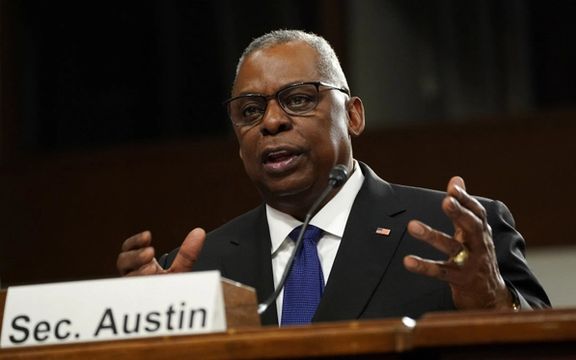
Amid heightened tensions between Iran’s proxy militia and US forces in Syria, some American senators criticized Biden administration's Middle East policy.
In separate conversations with Iran International’s correspondent Arash Alaei on Tuesday, Senators Josh Hawley (R-MO), Marco Rubio (R-FL), and Tommy Tuberville (R-AL) blasted the administration’s policy – or lack thereof – about how to deal with the Islamic Republic’s destabilizing acts in the region.
Senator Hawley said, “I don’t think this administration has a strategy” to counter the threats posed by Iran against the US forces in the region. “What they are doing is playing footsie with Iran, making nice with Iran, at precisely the time that we ought to be strengthening our allies and partners in the region to be able to counter Iran,” he added.
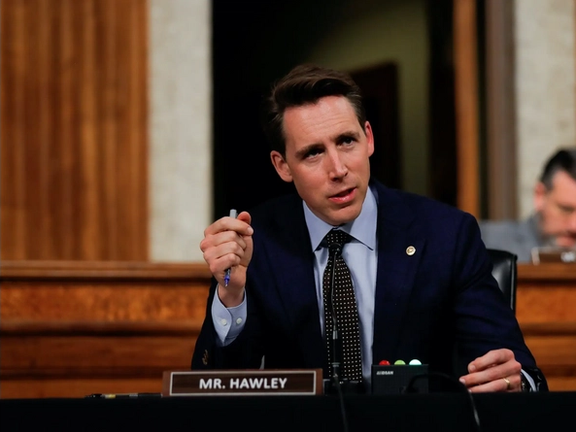
“I don’t think this administration understands at all the security challenges facing this country or national interests,” Hawley said.
Despite attacks on US forces in Syria last week by Iran-backed militia, the White House said Monday that Washington will not back away from its deployment to Syria. Nevertheless, the New York Times reported Tuesday that the White House held off a retaliatory attack against the Iran-backed forces in Syria on Friday after a second attack on US bases.
“We’re going to do what we need to do swiftly and boldly to protect our people and our facilities in Syria,” White House National Security Council spokesperson John Kirby said on Monday. “We’re not going to be deterred from continuing to go after this network in Syria... We're not going to be deterred … by these attacks from these militant groups."
Senator Rubio also defended the retaliatory attacks as “appropriate response”, saying that “Iran and their proxy groups are actively operating in both Syria and Iraq, trying to kill Americans.”

Senator Tuberville also voiced support for the US attacks, saying “I am glad we strike back... We did the right thing.” He added that the US should not allow Iran’s proxies to threaten the lives of Americans.
After a US civilian contractor was killed and six other Americans were injured March 23 in northeast Syria by a drone attack of “Iranian origin,” two US F-15 E fighter jets launched airstrikes against militant sites linked to Iran’s Islamic Revolutionary Guards – the IRGC – later in the day. The retaliatory strikes and exchanges of fire killed 19 Syrian and pro-Iranian forces. That prompted the proxy forces to launch rocket and drone attacks on Friday, injuring another American, but, according the NYT quoted a senior US official as saying the Biden administration did not give the go ahead for a second retaliation, while the American warplanes were poised to conduct a second round of reprisal strikes late Friday.
Also on Tuesday, Secretary of Defense Lloyd Austin told a Senate Armed Services Committee hearing on Capitol Hill that the US had only responded to four of 83 Iran-backed attacks on US troops in Iraq and Syria since Joe Biden took office in January 2021.
He admitted that the Biden administration should have notified lawmakers earlier than it did about the deadly drone attack on American forces in Syria, after Republican lawmakers grilled him over an almost 13-hour delay between the time of the attack and when Congress was notified.
Iran’s foreign ministry has condemned US retaliatory strikes on its proxy forces in Syria, labelling them as “terrorist aggression” against “civilian targets.”

Greek police said Tuesday they had arrested two men from a group that was planning to attack an Israeli restaurant in Athens, a case which Israel said was orchestrated from Iran.
The anti-terrorist agency launched the operation that led to the arrests on information gathered by the country's intelligence service, police said in a statement. It said the arrests had helped "dismantle a terrorist network" that was being managed from abroad.
A police official who declined to be named said the two men, 27 and 29 years old, were Pakistani nationals. According to the semi-official Athens News Agency, citing police officials, they were receiving orders from other Pakistani nationals in Iran.
Israel's intelligence service Mossad said in a rare statement that it had assisted in the investigation.
"The investigation exposed that the operation in Greece was part of a vast Iranian network, operated from Iran across many countries," it said.
The Iranian Embassy in Athens could not immediately be reached outside of business hours.
Greek police said they had confiscated digital evidence which revealed that the group was planning to attack a building of "special significance" in Greece and was looking for people who could help them carry out their project.
The police official said that the target was an Israeli restaurant in Athens.
"They were aiming at human loss and wanted to undermine security in Greece and hurt its foreign relations," the Greek police said in a statement.
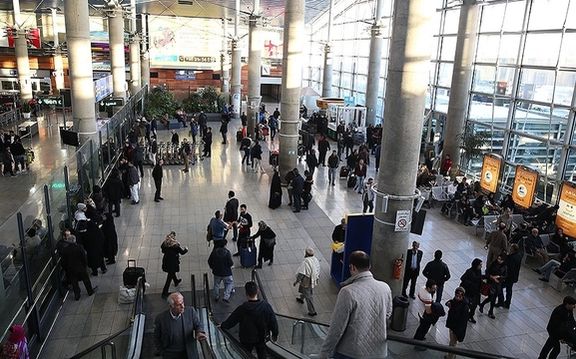
Iranians are emigrating from the country fleeing political and economic instability, with the UAE top of the list, a 600-page report issued in Tehran says.
Systematic corruption has also been a key factor for migration among the two groups of university students and graduates, and doctors and nurses. Sanctions and the falling national currency as well as inflation are the main factors affecting “businesspeople.”
In its latest annual outlook, Iran Migration Observatory says the UAE hosts the highest number of Iranians living abroad with over 450,000 Iranian-born residents, followed by the US, Canada, Germany, Turkey and the UK, as Iranians seek a better quality of life.
Although a report published in Iran cannot openly blame the political environment as a reason for migration, lack of social freedoms and the discriminatory nature of the authoritarian clerical political system also play a major role to drive young people out of the country.
A “lack of opportunities to be influential”, “feeling useless in the country”, and “lack of a promising prospect for the future” strengthen the motivation for migration and push people to actively plan for their emigration, the observatory said.
The number of Iranians living in Turkey has increased five-fold during the past seven years to stand at about 155,000. Based on international statistics, the report claims that more than two million Iranians are living abroad. However, the High Council of Iranian Affairs Abroad, an affiliate of the country’s Foreign Ministry, put the number at over four million people.
The report published in December covering 2022 also said that potential for growth and salaries were among other factors driving people out.
The risk of brain drain is also high as Iran fails to invest in key jobs of the future and technologies which surround that such as robotics, cloud computing and blockchain. The report called it “a chronic policy confusion,” and a crisis awaiting the human resources of the country.
Citing international databases, the document says Iran ranked 54th in terms of the number of migrants leaving the country. In terms of students going abroad to continue their studies, Iran ranked 17th.
Nationwide antigovernment protests since September and a further deterioration in economic conditions appear to have encourages more professionals to leave.
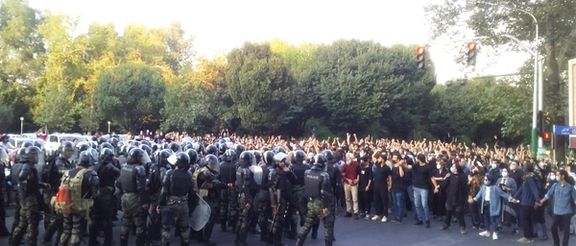
Oman is also emerging as a new favorite destination. During the past year about 30,000 personnel of different medical professions, including doctors, nurses, and paramedical technicians, have applied for Certificates of Good Standing with intent to immigrate to Oman.
In April, Iran's Medical Council said about 4,000 doctors have applied for Certificates of Good Standing in the previous 12 months with the intent to leave the country. Council spokesman Reza Laripour said that the annual number of such applications was less than 600 between 2013 and 2015.
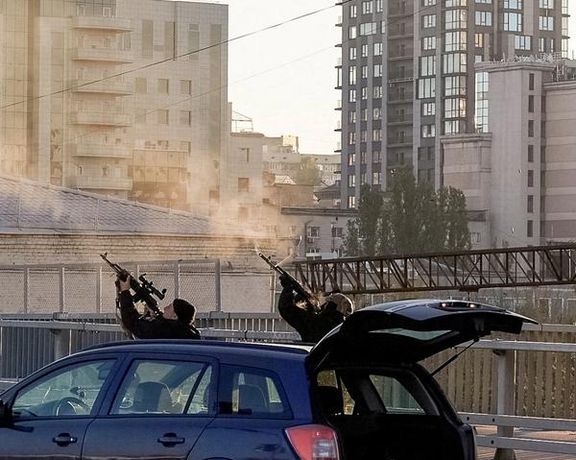
Ukrainian military officials say 12 more Iranian-made drones were shot down in the latest Russian attack on the capital city, Kyiv.
Serhiy Popko, head of the Kyiv city military administration said on Monday that the debris from a drone fell on a residential building in an area west of the capital. It caused major damage and a fire that was put out quickly, but no casualties were reported.
The Ukrainian Air Force announced Tuesday morning that Moscow had launched a total of 15 Iranian-made Shahed drones on Ukraine late Monday, with the air defense shooting down 14of them.
Last fall, Russia began using drones in its attacks against Ukraine's infrastructure, temporarily depriving millions of Ukrainians of heating, water and electricity during the winter.
The Ukrainian military reports that the probability of further missile and air strikes across the country remains high.
Ukraine says its air force has shot down more than 500 Iranian drones so far; an issue that Western countries have also confirmed.
Several countries such as the US and European Union have sanctioned Iran for its provision of drones in Russia’s war on Ukraine.
Iran has denied sending drones to Russia for months, but with increasing evidence, Foreign Minister Hossein Amir Abdollahian finally admitted the issue in November last year. However, he claimed that the deployment of drones was "limited and before the war in Ukraine".
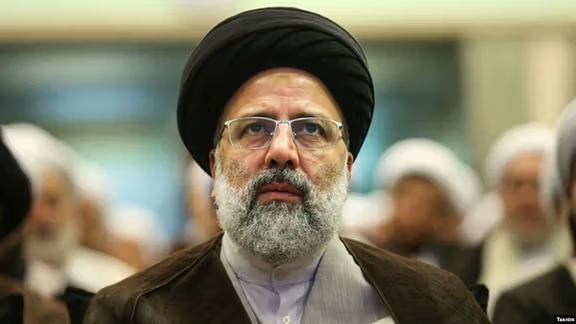
Iranian lawmakers have slammed the government's economic and other policies in interviews during Nowruz holidays as people complain about rising prices.
Ramezan Ali Sangdovini, representing Gorgan told Rouydad24 website that "Iran is overwhelmed by mismanagement." He added that "even those neighboring countries that are affected by wars are doing better than us."
Iran’s currency, rial, dropped to unprecedented lows right before the Nowruz, creating more chaos and despair for a population which has lost most of its purchasing power since 2018, because of US sanctions and a mismanaged economy.
Sangdovini stressed that "mismanagement is seriously endangering the integrity and authority of Iran's political system." He added: "Iran has no problem in resources and capital. All our problems are caused by mismanagement of resources.”
He reiterated that most of government managers are not fit for the positions they hold. Furthermore, the way they treat the people is less than perfect. Sangdovini said that the government cannot manage the falling national currency, rising prices and inflation rate.
He dismissed official comments about the "enemy's role in rising prices," and said the government is responsible. "The price of items such as dairy and gasoline is absolutely under the government's control. But it is not clear why the government refuses to keep the price of these items low."
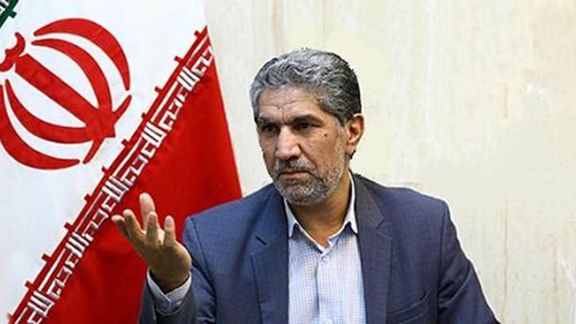
He warned the government that currently a large part of the population cannot afford to buy a kilo of meat. He added that the government has refused to send ministers to the parliament to answer lawmakers. The only solution for the Majles is to impeach the ministers," Sangdovini said.
Earlier, some lawmakers, including former nuclear chief Fereydoun Abbasi had said that the country's economic situation can only get worse, adding that the government lacks the will and authority to solve the problem.
Many politicians and commentators have been urging the regime to reach an agreement with the United States over its nuclear dispute and try to remove crippling sanctions, but so far talks with the West remain suspended.
Meanwhile, another lawmaker, Jalal Mahmoudzadeh told reporters that the only way to sort out Iran's economic chaos is to summon President Ebrahim Raisi to the parliament. "Not only there has not been any progress in fixing the economic since Raisi took office in 2021, but the country has even lost ground in some areas as a result of the government's inefficiency."
He added that the parliament should deal with the matter and step in to sort out the problem once and for all. "We should summon Raisi to the Majles and question him and demand convincing answers from him; and if we are not convinced, then we should use the parliament's supervisory leverage," meaning to impeach the President. "He is the chief executive and should be accountable for the current situation," Mohammadzadeh said.
He reminded that when Raisi took office, he promised to control inflation and boost the national currency. He also promised to create four million jobs during the four years of his presidency. We see that not only none of these have happened, but Iranians lost 10 million jobs because of restrictions the government has imposed on access to the Internet. This comes while based on Raisi's promises, he should have created 1.5 million new jobs during this period.
Meanwhile, Mohammadzadeh warned lawmakers that if they fail to make Raisi accountable for his poor performance, their own electability will be at risk in the next parliamentary election in 2024.